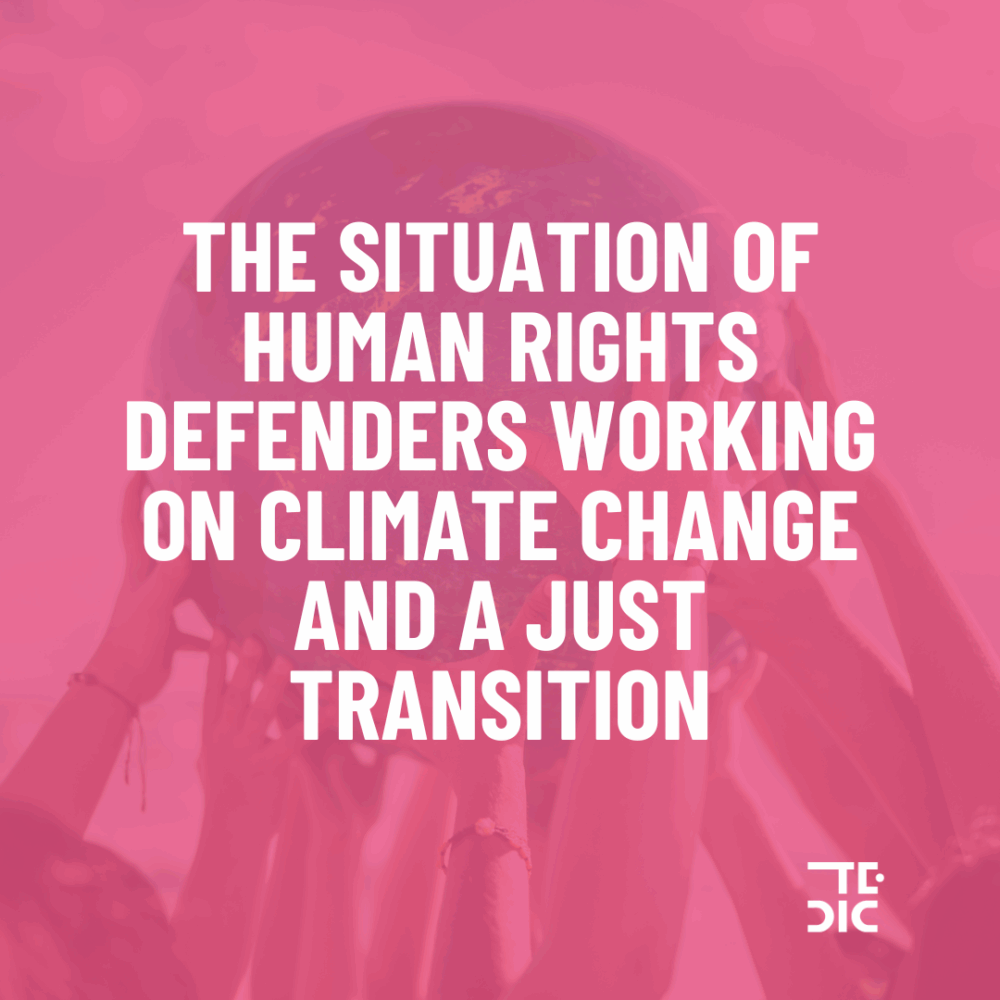
At TEDIC, we contributed to the report by the Office of the United Nations High Commissioner for Human Rights (OHCHR) on the situation of human rights defenders working on climate change and a just transition. This report aims to highlight the challenges and risks these key actors face and to offer recommendations for their protection.
The regional contribution was coordinated by Derechos Digitales and included organizations such as Nupef (Brazil) and TEDIC (Paraguay). Our focus from Paraguay centered on the impact of the extractivist model—particularly agribusiness—on rural and Indigenous communities, as well as the risks faced by climate and digital activists.
Paraguay: Extractivism, Criminalization, and Dispossession
In Paraguay, the situation is particularly alarming. The economic model based on agribusiness and the expansion of monocultures—especially genetically modified soy—has deepened inequality, severely affecting Indigenous and rural communities. Pressure on land has led to forced evictions, loss of livelihoods, and persecution of land defenders.
This violence is not limited to the physical sphere: it also manifests through defamation campaigns, arbitrary legal proceedings, and the systematic criminalization of those who speak out against environmental impacts.
In this context, the report—prepared by Paz Peña for TEDIC—offers a critical perspective on the digital transition. It argues that in a context of twin transitions (digital and climate), both must be addressed through a lens of justice. Otherwise, the sectors most left behind in terms of digital access—often the same communities most affected by the ecological crisis—will again be excluded from solutions and decision-making.
Digital Disconnection as a Tool of Repression
One of the most critical issues we highlight at TEDIC is how lack of connectivity becomes a tool of exclusion and control. In northern regions of the country—such as the departments of Concepción, San Pedro, and Amambay—there have been reports of deliberate internet and mobile phone service disruptions during times of conflict or repression.
These outages particularly impact community journalists, land defenders, and activists seeking to document abuses or mobilize. Digital disconnection hinders fundamental rights such as freedom of expression, access to information, and the ability to report violations.
Public Funds for Surveillance: The CONATEL Case
Another critical issue raised in the report is the use of connectivity funds to purchase facial recognition systems, in a country where many rural areas still lack basic internet access. The National Telecommunications Commission (CONATEL), the regulatory body, diverted resources from the Universal Service Fund—theoretically intended to ensure connectivity in marginalized areas—to finance mass surveillance technologies without public debate or proper oversight.
This raises serious concerns about the militarization of public space and violations of the right to privacy, especially in a context where social protest is under constant surveillance.
Cybersecurity and Digital Surveillance
Together with Fundación Karisma, we also documented increasing risks in the digital environment. In Paraguay, environmental defenders, journalists, and civil society organizations have been targeted by:
- Leaks of personal data by authorities or media aligned with corporate interests.
- Stigmatization and disinformation campaigns on social media.
- Cyberattacks aimed at silencing or intimidating groups that report human rights violations.
This is compounded by the lack of a national cybersecurity strategy with a human rights approach, leaving individuals and collectives in a state of high vulnerability. TEDIC has consistently advocated for a democratic digital agenda that includes data protection, safe internet access, and citizen participation in tech policy-making.
The absence of a data protection law in Paraguay exacerbates these risks, especially for women, who lack legal resources to protect their rights. UN Women has emphasized that protecting personal data, particularly in contexts of gender-based violence and surveillance, is key to autonomy and safety.
Key Recommendations for a Just Transition
The regional document, which strongly reflects TEDIC’s findings in Paraguay, offers several recommendations to OHCHR and States. Some of the most relevant include:
- Recognize and protect environmental and digital defenders, and sanction acts of criminalization and harassment.
- Avoid the use of mass surveillance technologies like facial recognition, especially when financed with public funds meant for essential rights such as connectivity.
- Ensure full connectivity in rural areas and historically marginalized communities as a prerequisite for exercising rights and participating in climate policy discussions.
- Take urgent measures to prevent arbitrary disconnections during protests or social mobilizations.
- Develop cybersecurity frameworks that respect international human rights standards and ensure the safety of defenders.
- Involve civil society in the formulation of digital and environmental policies, ensuring transparency, access to information, and accountability mechanisms.
At TEDIC, we reaffirm our commitment to a just, inclusive, and democratic climate transition, where technologies are tools for human rights—not instruments of repression. We will continue working to ensure the voices of communities affected by extractivism, disconnection, and surveillance are heard at national and international decision-making levels.
Download the report submitted to OHCHR here.
This publication was funded by the European Union. Its contents are the sole responsibility of TEDIC and do not necessarily reflect the views of the European Union.
